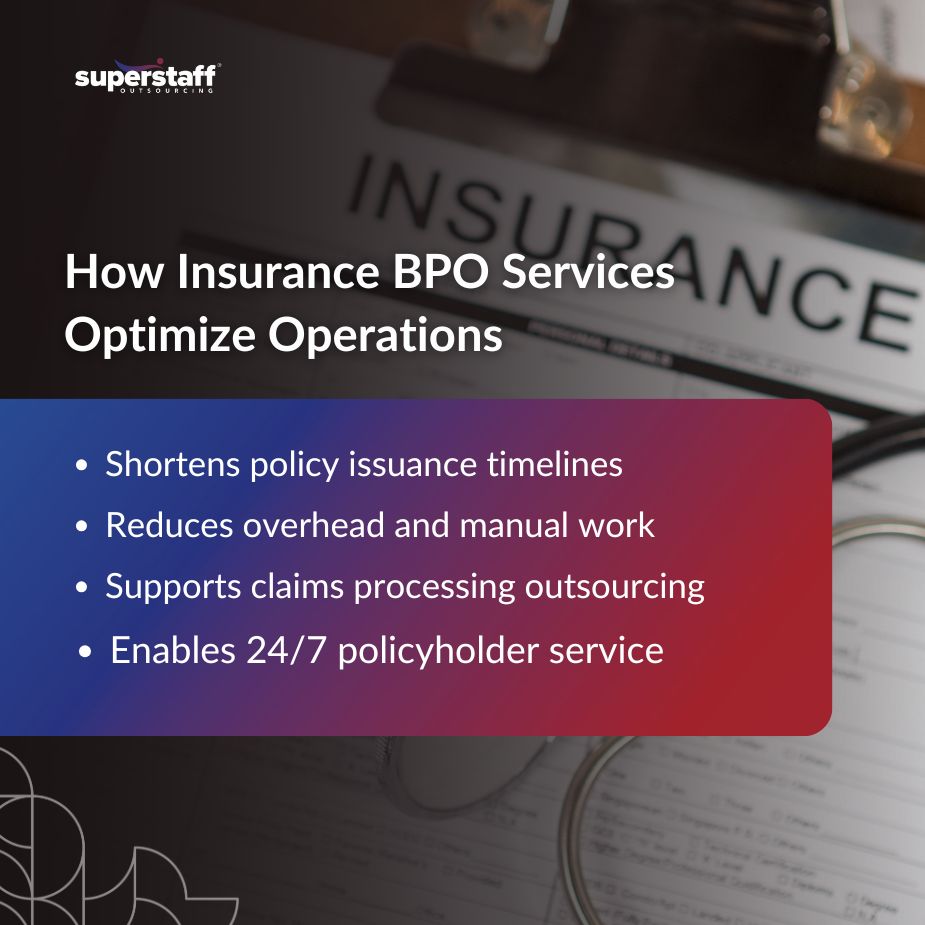
The insurance industry is under pressure—from rising claims volumes to talent shortages and compliance complexities. Traditional in‑house processes are proving too rigid and costly to keep up. Business Process Outsourcing (BPO) for insurance is helping carriers streamline operations, cut costs, and improve service. This blog explains what insurance BPO services are, the services included, and how they transform operations for small to mid‑sized insurers aiming to grow with agility.
What Is Insurance BPO?
Insurance BPO refers to delegating non‑core yet essential tasks to specialized third‑party service providers. Rather than assigning one‑off freelancers to handle overflow, insurance BPO services tap into a structured, scalable, and compliant framework tailored for insurers. These providers manage administrative and transactional workloads and offer support across underwriting, claims, policy administration, and customer service.

Think of it this way: instead of hiring temporary staff during surge periods, insurers partner with a provider that has trained professionals, robust infrastructure, and established workflows. This setup enables seamless scalability during peak demand while ensuring full compliance and consistent service quality. Now that we’ve defined insurance BPO services, let’s look at the most common services outsourced.
Key Services Offered by Insurance BPO Providers
BPO providers offer a range of support across the policy lifecycle, helping insurers reduce overhead and get deals done faster. Core offerings include claims processing outsourcing, policy administration, underwriting support, customer service and contact center support, billing and collections, and data entry and document indexing.
By offloading repetitive, back‑office tasks, carriers free up internal teams to focus on high‑value activities like developing new products and cultivating client relationships. But the real value isn’t just the list of services—it’s how these services transform insurance operations.
How Insurance BPO Transforms Operations
Outsourcing drives measurable improvements in efficiency, cost control, and customer experience. Insurance firms often face cyclical workloads—think annual enrollment seasons or unexpected losses—and complex workflows that benefit from flexible resourcing. With insurance BPO services, turnaround times on claims and policy issuance can drop dramatically. Policyholders receive faster answers and better support around the clock, thanks to 24/7 operations.
Reduced overhead comes from automation and offshore support; staffing, technology, and office costs shift from the insurer to the BPO. Internal teams can stay lean and concentrate on compliance and client engagement rather than memos, forms, and follow‑ups. The result: smoother workflows, happier clients, and a competitive edge. These benefits have made BPO not just a support tool—but a strategic asset for insurers.
Why Insurance Companies Are Embracing BPO in 2025
Several key trends are accelerating BPO adoption across the insurance industry. The shift to digital, hybrid and remote work models, and rising customer expectations all play a role. Talent shortages in claims and underwriting have made it harder to staff up quickly. Regulatory pressures require specialized compliance knowledge. Insurtech disruption demands operational agility. And consumers increasingly expect smart, omnichannel customer support—where insurance BPO services deliver huge advantages. These drivers are pushing carriers to offload routine functions so they can stay nimble and compliant in a fast‑changing market. That said, not all BPO providers are built the same—choosing the right partner is critical.
How to Choose the Right Insurance BPO Partner
The success of outsourcing depends on finding a BPO partner aligned with your business goals and regulatory requirements. Look for providers with proven insurance domain expertise and scalable infrastructure. Check their regulatory compliance experience (HIPAA, NAIC standards, data protection), technology integrations (with your policy administration system, CRM, or claims platform), and security certifications.
Ability to ramp up during peak seasons—like open enrollment or catastrophe response—is also vital. A strong partner offers hybrid models too, blending onshore oversight with offshore execution. By selecting an aligned provider, insurers can be confident they’re getting reliability, expertise, and scalability. Still wondering if BPO is right for your firm? Let’s look at some real‑world scenarios.
Case Scenarios: BPO in Action Across Insurance Lines
Different lines of insurance—health, life, auto, property—use BPO in unique ways, showcasing the adaptability of insurance BPO services.
In life insurance, one small‑to‑mid‑sized carrier working with a BPO provider shortened policy issuance time by outsourcing underwriting support. Agents became more responsive, and clients received approval faster. On the property side, a regional insurer tapped a Philippines‑based BPO team to scale claims support during hurricane season—handling surges without adding permanent staff.
Meanwhile, a health insurer outsourced billing and collections to streamline reconciliation and cut down on payment denials. With experienced teams managing documentation and follow‑up, denials dropped and revenue capture improved. These real‑world examples show how insurance BPO services deliver operational impact. With that in mind, let’s examine how to measure success.
Measuring ROI: Cost Savings and Beyond
While cost savings are a major driver, BPO’s ROI extends into quality, speed, and customer experience. Leading insurers now view insurance BPO services as a growth strategy, not just a cost‑reduction tactic.
Reduced average handling times mean clients get answers faster. Admin costs fall when back‑office volumes are managed offshore or automated. Customer satisfaction (CSAT) and retention climb because policyholders feel supported. Turnover and training costs shrink when internal teams avoid burnout from high-volume tasks.
Viewed holistically, insurance BPO services offer a multiplier effect: cost savings, better service, stronger compliance, and improved staff focus. As the insurance landscape evolves, BPO will play an even bigger role.
The Future of Insurance BPO
Insurance BPO services are evolving in parallel with AI and hybrid workforce models. Emerging roles now include AI-enabled fraud detection, predictive claims modeling, and virtual assistant integration. Hybrid models blend offshore human agents with automated workflows to deliver cost efficiency and high-touch service.
Nearshore and offshore locations—like the Philippines, Colombia, and India—continue to grow due to multilingual demand and strong STEM talent pools. As AI further automates routine tasks, BPO providers add strategic services like analytics, risk modeling, and customer insights. This makes insurance BPO services indispensable for carriers aiming to be agile, tech‑enabled, and client‑centric. Let’s bring it all together with the key takeaways.
Conclusion: Insurance BPO Explained
Insurance BPO isn’t just a support function—it’s a transformational strategy for modern insurers. From claims processing outsourcing to underwriting assistance, insurance BPO services redefine how carriers operate. They accelerate turnaround times, enhance compliance, improve customer satisfaction, and allow internal teams to focus on strategic priorities.
With digital acceleration, regulatory complexity, talent gaps, and customer expectations all rising, now is the time for decision‑makers in small to mid‑sized insurance firms to explore BPO. Discover how SuperStaff’s tailored insurance support solutions can help you scale efficiently, stay compliant, and deliver exceptional policyholder experiences. Reach out today to explore a customized roadmap for your operations — and see firsthand how insurance BPO services can change the game.






